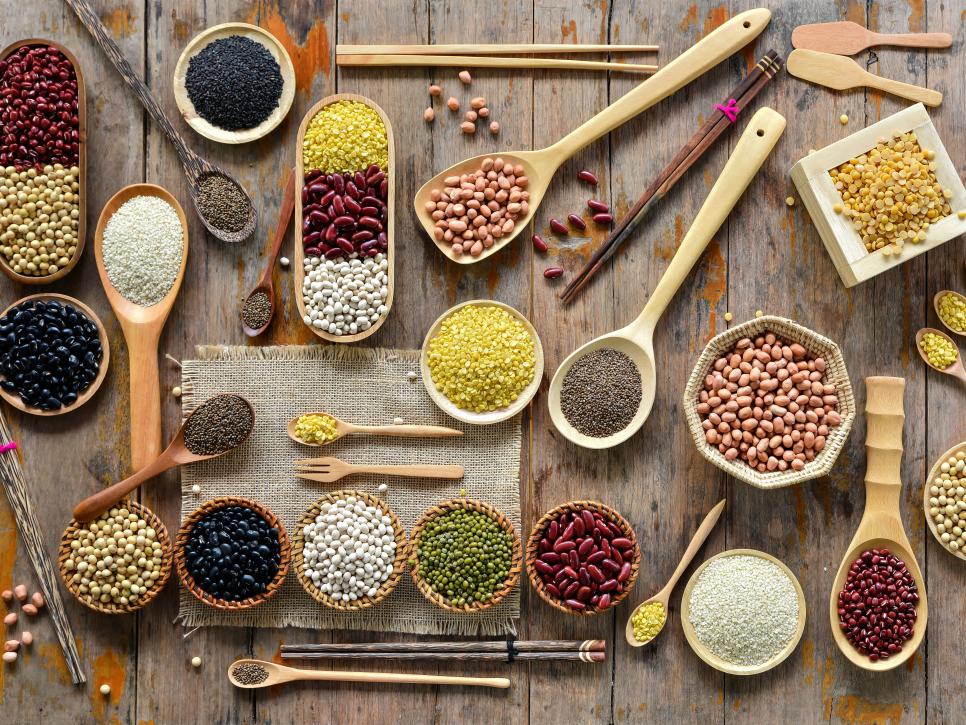 Incorporating more meatless meals into your diet is a great way to boost health. Research shows that eating more plant-based foods and fewer animal products can reduce the risk of heart disease, type 2 diabetes, and even some cancers. However, whether you choose to eat this way part-time or all of the time, there are a few nutrients that need more planning to ensure you are getting enough. Luckily, there many whole food sources, fortified foods, and supplements to ensure you are meeting the daily nutrient requirements. If you follow a vegetarian or vegan diet or plan on switching any time soon, be mindful of these 6 nutrients.
Incorporating more meatless meals into your diet is a great way to boost health. Research shows that eating more plant-based foods and fewer animal products can reduce the risk of heart disease, type 2 diabetes, and even some cancers. However, whether you choose to eat this way part-time or all of the time, there are a few nutrients that need more planning to ensure you are getting enough. Luckily, there many whole food sources, fortified foods, and supplements to ensure you are meeting the daily nutrient requirements. If you follow a vegetarian or vegan diet or plan on switching any time soon, be mindful of these 6 nutrients.
Vitamin B-12
Vitamin B12, found primarily in animal products, is needed for the production of DNA and maintaining nerve cells. A deficiency can cause megaloblastic anemia and nerve damage, among other problems. Therefore, a reliable source of B-12 is essential, especially for vegans, in order to prevent deficiency. Since fortified foods vary greatly in the amount of B12 they supply, a daily supplement is recommended instead.
Calcium
Calcium needs can be easily met without animal products since calcium-rich foods are found in all food groups. Vegan sources include leafy greens, calcium-set tofu, soybeans, tempeh, dried figs, almonds, tahini, broccoli, and chickpeas, as well as fortified foods.
Vitamin D
Also known as the sunshine vitamin, this is one nutrient that we don’t need to obtain directly from our diets during summer months. When the sun’s UV-B rays hit the skin, a reaction takes place that triggers skin cells to manufacture vitamin D. You don’t need much, as fair-skinned individuals can produce up to 10,000 IU’s of the vitamin with just 10 minutes of exposure. However, depending on your skin tone, where you live and the time of year, this amount can be harder to obtain directly from sunlight. Plant-based sources of vitamin D include fortified plant-based milk, tofu, some mushrooms, fortified breakfast cereals, and orange juice with calcium.
Iron
Iron is found in two forms, heme, and non-heme iron. Heme iron, found predominately in meat, poultry, and fish, is well absorbed. Non-heme iron, found in plant foods like fruits, vegetables, grains, and nuts is less well absorbed. As plant-based diets only contain non-heme iron, vegans especially should include foods that are high in iron and include techniques that can promote iron absorption. These include sprouting, soaking, and fermenting as well as including a Vitamin-C rich food source. Plant-based sources of iron include chickpeas, lentils, tofu, whole, and enriched grain products, raisins, figs, pumpkin, sunflower and sesame seeds, and broccoli.
Â
Omega-3s
Omega-3 fatty acids provide the building blocks for the brain, nervous system, and cell membranes. Vegetarians and vegan may have difficulty balancing the amount of essential fatty acids and the intake of omega-3 fats. Unlike omega-6 fatty acids, omega-3 fatty acids are less common in food, making it easy to be deficient in this important nutrient. Good sources of omega-3 ALA’s are found flax seeds, hemp seeds, chia seeds, walnuts, leafy greens, soybeans, and wheat germ. If these are not included regularly, supplementing with an algae-derived DHA/EPA supplement is encouraged.
Zinc
The main sources of zinc in the diet are usually animal products, followed by fortified cereals. However, many plant foods do contain zinc. Being mindful of incorporating these foods into your diet is important, especially since phytates in plant-foods can inhibit some of their absorptions. However, the effects of phytates can be lowered through fermentation, soaking, and boiling root vegetables. Good sources of zinc include tofu, tempeh, pumpkin, black beans, chickpeas, lentils, oatmeal, tahini, and cashews.
Alex Caspero MA, RD, RYT is a Registered Dietitian Nutritionist and Yoga Teacher. She is the founder of Delish Knowledge (delishknowledge.com), a resource for healthy, whole-food vegetarian recipes. In her private coaching practice, she helps individuals find their “Happy Weight.â€Â
*This article was written and/or reviewed by an independent registered dietitian nutritionist.
source :